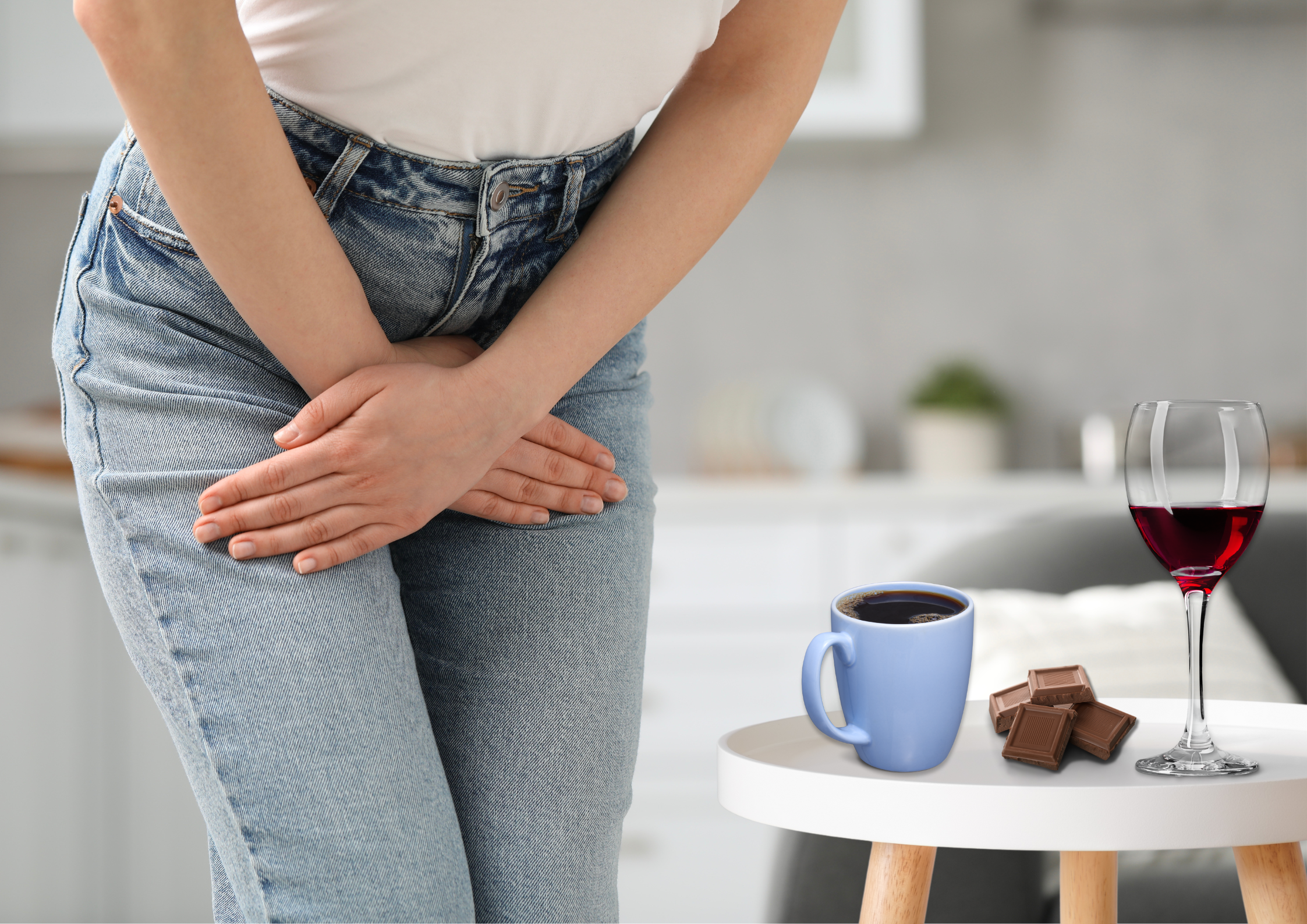For many of us, the day just doesn’t feel right without a morning coffee, a bit of chocolate in the afternoon, or a glass of wine to unwind.
But if you’re managing urinary incontinence (UI), you might have noticed a frustrating pattern: your favorite treats might not be loving your bladder back.
Here’s the good news: you don’t have to give them up entirely.
It’s about finding a smarter balance, so you can enjoy life’s little pleasures without paying the price later.

Coffee and Bladder Health
What’s happening:
Coffee is a double whammy for people with UI. It’s not just the caffeine (a known bladder irritant), but also coffee's natural acidity.
Caffeine can overstimulate the bladder muscle, making you feel the urge to go much sooner—even if your bladder isn’t full yet.
Signs it’s affecting you:
-
Frequent urges right after drinking coffee
-
Feeling like you "can't hold it" even with small amounts of urine
-
Occasional leaks if you delay getting to the bathroom
Practical Balance Tips:
-
Cut, don’t quit: Try switching to half-caf or low-acid coffee.
-
Timing matters: Enjoy coffee earlier in the day, when accidents are easier to manage.
-
Hydrate smart: Pair every cup of coffee with a glass of water.

Extra Support Tip:
If leaks still sneak up on you, Leak-Proof Underwear offers invisible protection that feels just like regular underwear, giving you peace of mind while you enjoy your favorite brew.

Wine (and Alcohol in General)
What’s happening:
Alcohol acts as a diuretic, it signals your kidneys to flush out fluids faster. It also lowers your awareness of bladder fullness, leading to urgent surprises.
Signs it’s affecting you:
-
Nighttime accidents or multiple trips to the bathroom
-
Leaks after just one or two drinks
-
Feeling less "in control" after drinking
Practical Balance Tips:
-
Choose wisely: Wine tends to be gentler on the bladder than beer or spirits.
-
Alternate drinks: For every alcoholic drink, have a glass of water.
-
Mind the clock: Finish alcohol 3–4 hours before bed to minimize nighttime urgency.
 Strengthen From Within:
Strengthen From Within:
Incorporating pelvic floor strengthening tools like The PelviTone™ can make your bladder more resilient over time, so occasional indulgences feel less daunting.

Chocolate’s Sneaky Effects
What’s happening:
Chocolate contains caffeine and theobromine, compounds that can stimulate the bladder. Dark chocolate has more than milk chocolate, but even small amounts can add up.
Signs it’s affecting you:
-
Mild but nagging urgency
-
Leaks triggered by laughter, sneezing, or quick movements
Practical Balance Tips:
-
Watch the quantity: A small piece after lunch is usually better tolerated.
-
Pick lower-caffeine sweets: Milk chocolate is generally a gentler choice.
-
Test and tweak: Notice how you feel after eating chocolate and adjust from there.
 Building a Bladder-Friendly Mindset (Without Deprivation)
Building a Bladder-Friendly Mindset (Without Deprivation)
It’s easy to feel like you have to "give up everything fun" to manage bladder leaks, but that's not the full story.
Mindful enjoyment—not cold-turkey elimination—is key:
-
Listen to your body: Track your symptoms after eating or drinking common triggers.
-
Make small swaps: Herbal teas, mocktails, or lower-caffeine chocolates are great alternatives.
-
Plan your moments: Schedule bathroom breaks before urgency strikes, and consider protective support like Leak-Proof Underwear for extra comfort.
And most importantly?
Give yourself grace.
Bladder leaks are a medical condition—not a moral failing.
You’re allowed to love your life and take care of your health at the same time.

Final Thoughts
Managing urinary incontinence doesn’t have to mean cutting out every joy.
By understanding how treats like coffee, wine, and chocolate interact with your bladder, and making thoughtful adjustments, you can enjoy life's little pleasures with more confidence and less stress.
Key Takeaways:
-
Moderation often works better than full elimination.
-
Timing (like avoiding late-night coffee or wine) can make a real difference.
-
Small swaps and hydration habits can minimize symptoms.
-
Your body’s signals are your best guide, pay attention and adapt gently.
Small changes add up to big freedom.
You deserve to savor every sweet, rich, beautiful moment life offers.




Share:
The Silent Struggle: Why Women Don’t Talk About Incontinence (And Why We Should)
The 5 Types of Leaks (and Which One You Might Have)